Reading Law: The Interpretation of Legal Texts
£68.40
In this groundbreaking book, Scalia and Garner systematically explain all the most important principles of constitutional, statutory, and contractual interpretation in an engaging and informative style – with hundreds of illustrations from actual cases. Is a burrito a sandwich? Is a corporation entitled to personal privacy? If you trade a gun for drugs, are you “using a gun” in a drug transaction? The authors grapple with these and dozens of equally curious questions while explaining the most principled,lucid, and reliable techniques for deriving meaning from authoritative texts. Meanwhile, the book takes up some of the most controversial issues in modern jurisprudence. The authors write with a well-argued point of view that is definitive yet nuanced, straightforward yet sophisticated. – Publisher.
Read more
Additional information
| Publisher | West Group (19 Jun. 2012) |
|---|---|
| Language | English |
| Hardcover | 567 pages |
| ISBN-10 | 031427555X |
| ISBN-13 | 978-0314275554 |
| Dimensions | 16.51 x 4.45 x 23.5 cm |

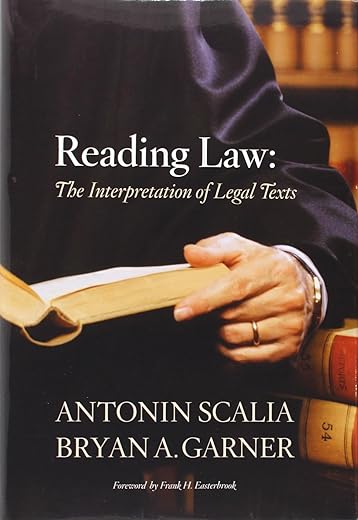
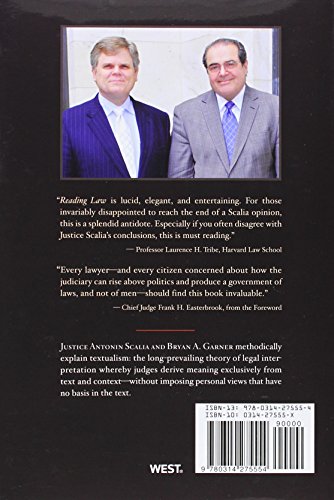
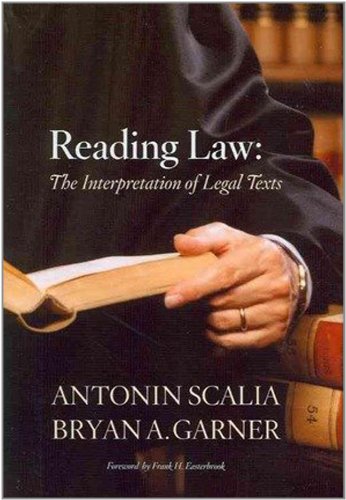
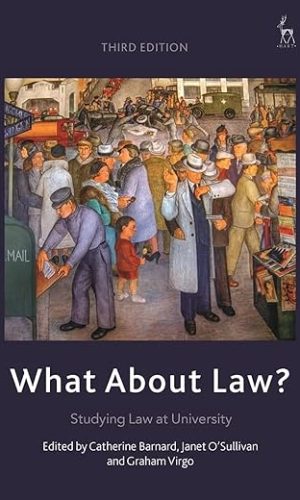

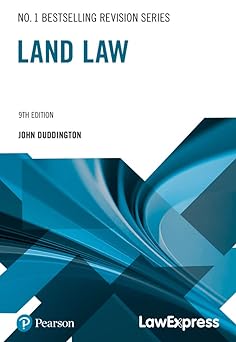
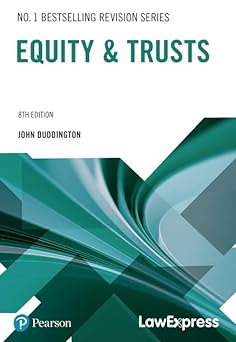


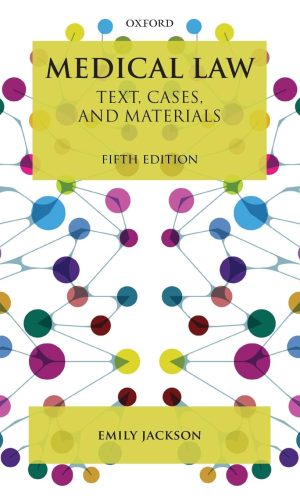
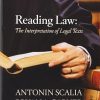
by Frugal
This work should be required reading for all judges facing the interpretion of a constitutional provision, and for any advocate about to argue such before such judge. It is both succinct and adroit.
If you have a friend who is appointed to the judiciary, there can be few better gifts to mark that appointment.
by Amazon Customer
Controversial (because Justice Scalia is one of the authors), but a brilliant piece of scholarship nonetheless.
by Mark Pummell
for me a very useful and original text; fresh insights and classificatory models that i’ve found very useful in these early days of my LLB studies…
by Kelvin LEE
A good book which summarised principles in relation to interpreting statutory provisions in common law in simple language with examples. I guess many have come across Bennion but this one is much easier to understand. I have the great honour to hear Justice Scalia and Professor Garner to speak on the book in Hong Kong shortly before Justice Scalia passed away…
by sioraf
If had not been clear before, the final line of the book will leave the reader in no doubt that the argument throughout ‘Reading Law’, more than for originalism or textualism, is for democracy itself.
Out of the dry matter of judicial interpretation, Scalia and Garner make an elegant case for judicial restraint as one of the bedrocks of American democracy. The authors codify canons of statutory interpretation that have enjoyed storeyed use, predominantly borrowing from Anglo-American jurisprudence. In a subsequent section, they deal with a variety of false notions and half-truths, reserving particularly withering scorn for legislative intent. (Which legislative intent? Of one congressman? Or lobbyist? And at which point in the legislative process? And why should the voice of one be allowed to rule the democractic will of the assembly as reflected in the words of the statute?)
The authors’ case is that judicial respect for the statutes issuing from democratic assemblies is respect for the democratic process itself. It is clear throughout the work that the authors view the beginning of judicial activism as the end of democratic oversight and control. Scalia and Garner write respectively from a social conservative and socially liberal perspective, in favour of originalist and textualist interpretative approaches, and it is greatly to be regretted that these approaches are often crudely described as conservative, as though liberalism and the soundest interpretations of the democratic will were contradictory. To be a liberal textualist or liberal originalist is no more contradictory than to be a conservative consequentialist.
There is a poignancy too in reading the text: how greatly it is to be regretted that one American’s finest jurists was taken from us in – judging by this work – his intellectual prime.